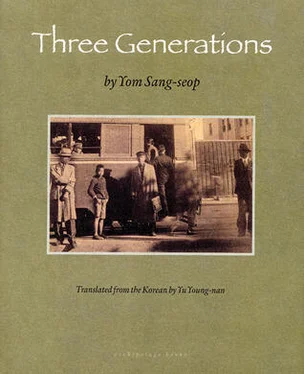The old man now remained quiet and attentive. When he didn’t reply, the Suwon woman thought he was willing to listen, so her lips danced ever more busily and excitedly.
No one likes to take care of old people, and there is a saying that even the most devoted son cannot deal with a parent’s long illness. The old man believed he had no one to rely on but the Suwon woman, who had joined his family without any roots of her own to speak of, though he had a son and a grandson and a considerable sum of money — enough to be talked about throughout the country. Even if the best medicines were brought in, a servant would brew it, and if it had simmered too long, the servant would just add water, diluting the medicine and reducing its effect. If too much medicine were left at the end of brewing, the servant would throw some away to make it look like a perfect concoction. The more he thought about it, the more admirable he found the Suwon woman and the more grateful he felt that she looked after him without a murmur of complaint. When he first took her in, the entire family had been against it, but what would have become of him without her? It would be the Suwon woman — no one else — who’d spoon him water on his deathbed.
“As for Deok-gi, he wrote to his wife, but he hasn’t written you a line, has he?”
“He wrote as soon as he arrived. Did he write again?”
“A letter came yesterday, I think.”
The old man called his granddaughter-in-law.
“Child, I heard your husband wrote a letter.”
“Yes, sir.”
“Then why didn’t you show it to me?”
The old man’s nerves were frayed. These days he felt the need to supervise everything, including things that had nothing to do with him. He easily lost his temper and grew even more irritable after listening to the Suwon woman.
“There’s nothing special in it. He asks me to send a book that he left in his room, along with his necktie.”
“Bring it to me anyway!”
The granddaughter-in-law didn’t wonder about his behavior; she knew that it was another of the Suwon woman’s ploys. She had no choice but to retrieve the letter and hand it over.
It contained nothing else of interest. Deok-gi simply asked whether his grandfather was better and went on and on about his child, telling his wife to be careful so that he wouldn’t catch a cold and not to let him fall asleep at her breast — something he might have read in a women’s magazine. The old man’s feathers were ruffled.
Suddenly, the young one knows how precious his own child is! he thought. Then he asked, “So did you send him what he wanted?”
The granddaughter-in-law tried to read the expression on the grandfather’s face, nervous over whether he’d throw a tantrum over something unexpected. “Not yet, sir.”
“I don’t have time to write a letter, so write him in detail. Tell him how sick I am and that this time I won’t recover.” That said, he ordered her to wrap up the things Deok-gi wanted and give them to Secretary Ji in the outer quarters to mail. He also told her that she’d better supervise what was going on inside the house.
“As for my medicine,” he added, “if you can’t be bothered to brew it yourself, how do you expect me to get better? Isn’t it your duty?” He wanted to make himself perfectly clear without being too severe.
Nevertheless, the granddaughter-in-law found it unfair. Who else in the house paid more attention to brewing his medicine? The Suwon woman rattled on about it but never once brewed a single dose with her own hands! What could the young granddaughter-in-law do? She couldn’t express her feelings to anyone in the family. She could only confide in her own parents.
“I’m doing the best I can, but. ” She didn’t continue, afraid that she might sound as if she were talking back.
“That’s why I said you should pay more attention.” He sent her away, still bruised by his grandson’s apparent lack of concern over his illness.
After breakfast, Sang-hun visited his father to pay his respects. He had come by every morning and evening without fail since the old man had taken ill. His greeting consisted of no more than a few moments in the sick room, but these few moments were tedious for both men.
“Do you drink every morning?” The old man examined the color of Sang-hun’s face.
Sang-hun hadn’t drunk much, though he had gone from Cheongmokdang to Maedang House the night before, and his eyes were red from lack of sleep. He didn’t normally overdo it, but recently he found he couldn’t hold his alcohol very well.
“You didn’t come here to see your father. You came to get rid of your hangover with some of your drinking buddies.” The old man turned his face away.
Sang-hun stood silently before taking his leave.
“Don’t come again! Even if I die, no one will bother to tell you! Go hole yourself up in a bar or some woman’s house!” The old man barked at his son’s back, like a splash of ice-cold water.
The father’s outbursts always cut deeply. At such moments, Sang-hun was ashamed to be seen by the servants and his young daughter-in-law. He had made a vow to himself to be sincere with his father, for the old man’s days seemed numbered, even if he couldn’t act as his father wished. He became a sulking child.
I admit I’m not the most admirable son, but one can feel devotion only when the elder is willing to accept it, Sang-hun thought. Father and son had never exchanged kind words, but their relationship had grown much worse since the Suwon woman joined the family. Sang-hun couldn’t blame his wife for this situation, though she was ready to pounce on the newcomer day and night. Recalling that the Suwon woman had been at Maedang House the day before, he thought that she shouldn’t be allowed to remain in the house, but he couldn’t do anything when it came to his father’s affairs. Once his father died, she would no longer be part of the family, regardless of the fact that she had given birth to his father’s child. In fact, she might be frequenting Maedang House with her future in mind. The biggest worry was that she’d take away hundreds of bags of rice. If she kept the assets and raised the child well, it would be a different story, but Sang-hun begrudged her even that much, believing that the rice would end up in some strange man’s hands. Who knew whether someone hadn’t already attached himself to her with an eye on the inheritance? She couldn’t have told the old man that she’d met Sang-hun there, because it would reveal her own secret, but why did his father suddenly throw a fit, telling him to hole up in a bar or a woman’s house? He’d never said that before. Had the Suwon woman been slandering him? That would be intolerable.
Sang-hun played for a while with his grandson, who was on his nanny’s back. When he headed toward the outer quarters, he stumbled upon the Suwon woman at the outer gate.
“How long have you known Maedang?” Sang-hun asked quietly as she passed by. He brought it up as a warning that she shouldn’t frequent the place, but he kept his voice hushed out of consideration for her.
“Maedang? I met her some time ago. I ran into her yesterday when I was getting something at Jongno. She urged me to stop by her house, so I went for a bit. Do you know her, too?”
Sang-hun was stunned that she spoke at full volume. She acted as if she wanted everyone to hear.
“Regardless of whether I know her, didn’t we run into each other there yesterday?” A faint smile appeared on his lips, but his eyes scolded her.
The Suwon woman pretended to be astonished. “Did we? I wasn’t sure that was you. Why do you drink there? Are you friends with the man of the house?”
“Yes, I know him. How long have you known Maedang?”
Читать дальше












